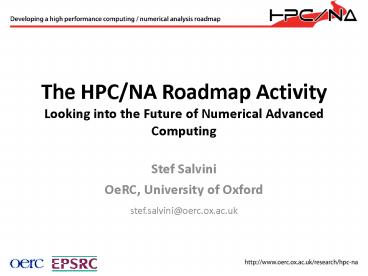Stef Salvini - PowerPoint PPT Presentation
1 / 22
Title:
Stef Salvini
Description:
... I.S. Duff, Rutherford Appleton Laboratory. Prof. P.V. Coveney, University ... Background work. considering DOE ... Collect information about ongoing ... – PowerPoint PPT presentation
Number of Views:70
Avg rating:3.0/5.0
Title: Stef Salvini
1
The HPC/NA Roadmap Activity Looking into the
Future of Numerical Advanced Computing
Stef Salvini OeRC, University of
Oxford stef.salvini_at_oerc.ox.ac.uk
2
The Main Players
- Prof. A.E. Trefethen, University of Oxford
- Prof. N.J. Higham, University of Manchester
- Prof. I.S. Duff, Rutherford Appleton Laboratory
- Prof. P.V. Coveney, University College London
- Sponsored by EPSRC
3
Talk Contents
- Background
- The HPC/NA Roadmap
- The Future Implementing the Road Map
4
HPC/NA Webpage
http//www.oerc.ox.ac.uk/research/hpc-na /roadmap
5
1. Background
6
Vision for the HPC/NA Roadmap
- The Grand Challenge is to provide
- software
- Reusable in different fields and applications
- High quality
- High performance
- Long-term supported
- Libraries, modules etc
- Hopefully, self-adapting to parallel modes,
hardware, etc - a community that allows
- communication of interdisciplinary knowledge
- development of appropriate skills.
7
Aims of the HPC/NA Roadmapping Activity
- Survey a range of applications and users to
understand - The role and limits of a common algorithmic base
- How this is currently delivered and how should be
in the future - Current applications requirements and limitations
- Their future requirements
- Road-blocks that limit the applications future
exploitation - Knowledge gap between algorithmic developments
and deployment - Practical issues in the way of algorithmic
content delivery - Computing languages
- Vehicles for delivery
- etc
8
HPC/NA Roadmap Activities
- Community Consultation
- Workshop 1 Oxford, Nov 2008
- Applications focus
- Workshop 2 Manchester, Dec 2008
- Algorithms/NA focus
- Workshop 3 London, Jan 2009
- Review of Roadmap V1, further user industry
perspectives - Background work
- considering DOE/DARPA/NSF workshops
- Discussions with applications outside of
workshops - Good participation
- 80 active contributors
- Application scientists, Users, Numerical
analysts, Computer scientists - Physics, Biology, Chemistry, Engineeering,
Finance, Oceanography, etc
9
2. HPC/NA Roadmap
10
Theme 1 Cultural Issues
- Identify potential community players across
- application domains
- numerical analysis
- computer science
- Develop community models to
- Share algorithms, software and ideas
- Provide activities
- workshops,
- Training
- virtual meeting spaces.
- Engage internationally
11
Theme 2 Applications and Algorithms
- Identify exemplar applications to
- baseline models for communication and
benchmarking - Develop map of algorithms across application
domains - Indentify impact of algorithms across discipline
groups - Take mapping of DWARFs or similar on capability
computing - Develop map of developments internationally
- Collect information about ongoing related
activities - Discuss with international funding agencies what
plans are in place in this area
12
Common Future Algorithmic Requirements
- Optimisation
- Scalable FFT
- Adaptive mesh refinement
- Adaptive algorithms
- Eigenvalue/eigenvector (all or few)
- Iterative implicit solvers
- Out of core algorithms to enable larger problems
13
Major Future Applications Issues
- Load balancing
- Meshes
- particle dynamics and computation of interactions
- Better software environments for complex
application development - Adaptive software to automatically meet
architectural needs - Use of novel architectures (in the immediate
future) - FPGAs
- GPUs
- IBM Cell
- Other....
- Coupling between different models and codes
- Error propagation
- Scalable I/O
- Visualisation
14
Theme 3 Software Challenges
- Abstractions for more effective application
development - Computer scientists contribution essential
- Code generation and adaptive software systems
- automatic delivery of efficient code for complex
architectures - Guidance on best practice for software
engineering development - Frameworks and tools for application developers
- Better reuse of algorithms
- Better understanding of usability issues for
complex software systems
15
Theme 4 Sustainability
- Address the sustainability of
- application codes
- software libraries
- skills
- Models for sustainable HPC software that might
include - Long term funding
- Industrial translation
- Open community support
16
Theme 5 Knowledge Base
- This theme is concerned with the general issue of
sharing of knowledge and knowledge creation. - The recommended actions are
- Develop mechanisms for collecting information on
existing - Software
- Expertise
- dissemination
- Develop mechanism for continuing community input
- Develop appropriate education and training
- MScs
- DTCs
- Short courses and summer schools.
- Engage industry (internships?) to ensure industry
needs are also met.
17
3. Implementation
18
Implementing the Roadmap
19
Implementing the Roadmap
- Develop EPSRC Network Proposal
- Keep momentum going with existing group
- Outreach to other groups
- Coordination of HPC-NA activities
- Bring together numerical analysts, computer
scientists application researchers/developers - Currently planned
- Please contact Prof. A.E. Trefethen, OeRC,
University of Oxford - Study Groups with Industry (cf. Smith Institute)
20
Implementing the Roadmap APACE
- APplication Advanced Computing Exchange
- http//apace.myexperiment.org/
- Community site built on same lines as
myExperiment - Will facilitate collection and exchange of
information on - numerical analysis algorithms
- definition of applications in terms of algorithms
- Expertise in applications and algorithms
- Global activity in development etc
- Build community groups
21
APACE Webpage
http//apace.myexperiment.org/
22
Thank You!
stef.salvini_at_oerc.ox.ac.uk http//www.oerc.ox.ac.u
k http//www.oerc.ox.ac.uk/research/hpc-na































